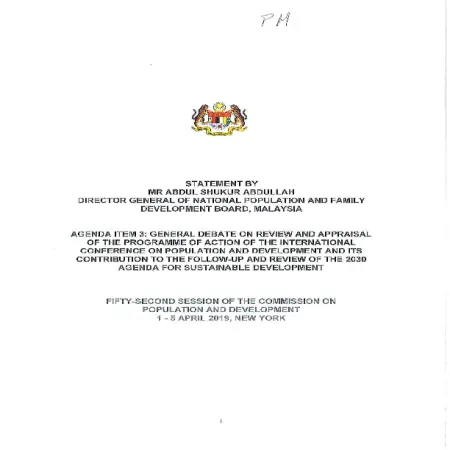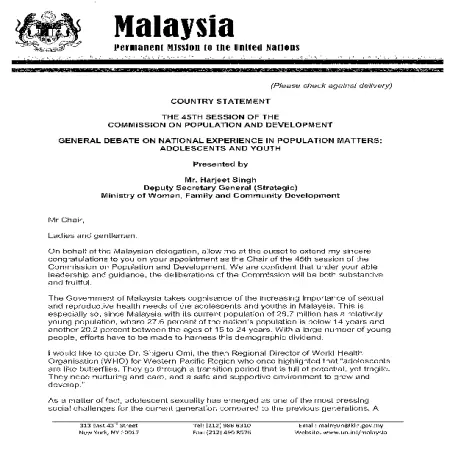Browse by Type
Results for Item type : "Country Statement"
|
|
The 57th Session of The Commission On Population And Development, United Nations New York, 29 April – 3 May 2024
Item Type: Country Statement
Editor:
Year: 00/05/2024
Abstract: Malaysia like many other countries is becoming an aging nation due to declining fertility and increasing life expectancy. As 10.7 per cent of its population aged above 60 in 2020, Malaysia is expected to reach aged nation status by 2030. In this regard, Malaysia has revised its National Policy for Older Persons to enhance the integration of the elderly into society and introduced measures to boost the number of geriatricians and aged care health professionals under the National Health Policy for Older Persons. Malaysia's commitment to adolescent healthcare is evident in the National Adolescent Health Plan of Action (2015-2020) and the revised National Policy and Plan of Action on Social and Reproductive Health Education (2022-2025). These initiatives emphasize sexual and reproductive health education rooted in religious and moral principles across different settings and age groups. The Government also provides comprehensive health care services which includes contraceptive and sexual and reproductive health services that are integrated into primary health-care facilities nationwide. Family planning services are also provided by the National Population and Family Development Board of the Ministry of Women, Family and Community Development, NGOs such as the Family Planning Associations as well as private practitioners.
|
|
|
|
|
|
The 56th Session of The Commission On Population And Development, United Nations New York, 10-14 April 2023
Item Type: Country Statement
Editor:
Year: 11/04/2023
Abstract: Education is a longstanding right enshrined in human rights and developmental instruments, including in the Plan of Action of the International Conference on Population and Development (ICPD). The ICPD Plan of Action also recognizes the key role of education in sustainable development, as well as the responsibilities of different stakeholders, particularly parents, in this regard. Investments in education systems are of utmost importance for population growth, as it empowers people to lead better, healthier and sustainable lives. For Malaysia, the education system serves as a fundamental component in our quest to be a developed nation, and in achieving the Sustainable Development Goals (SDGs). Strengthening of human capital through education is a priority to Malaysia, with the Government providing free education to citizens up to secondary level.
|
|
|
|
|
|
The 55th session of the Commission on Population and Development United Nations, New York, 25-29 April 2022
Item Type: Country Statement
Editor:
Year: 00/04/2022
Abstract: Malaysia’s socio-economic development has been significant in transforming our economy from a low income to an upper-middle-income status. We have achieved significant progress in eradicating poverty and narrowing inequalities. However, the COVID-19 crisis has resulted in vulnerable households falling into poverty and hardship.
|
|
|
|
|
|
The 54th session of the Commission on Population and Development: general debate on population, food security, nutrition and sustainable development
Item Type: Country Statement
Editor:
Year: 21/04/2021
Abstract: Malaysia’s population currently stands at 32,760,284 and is increasing at the rate of 0.6 percent per annum. Increased population increases food demand. Annually, Malaysia spends approximately USD8.33 billion (RM34.5 billion) on import of food supply, pointing to increased dependency food import purchases.
|
|
|
|
|
|
The 52nd session of the commission on population and development:general debate on review and appraisal of the programme of action of the international conference on population and development and its contribution to the follow-up and review of the 2030 agenda for sustainable development
Item Type: Country Statement
Editor:
Year: 01/04/2019
Abstract: The population of Malaysia has increased more than three-fold from 10.5 million in 1970 to about 33 million today. the population was growing around 2.5 percent per annum for the period 1970-2000 but it has declined to 1.7 percent between 2010 and 2018.
|
|
|
|
|
|
The 51st session of the commission on population and development :general debate on sustainable cities, human mobility and international migration, New York
Item Type: Country Statement
Editor:
Year: 09/04/2018
Abstract: Malaysia has taken the initiatives to systematically coordinate sustainable urban planning and development, with emphasis on a balanced development; physically, environmentally, socially and economically, such as through the introduction of the Safe City Concept, and Go Green Kuala Lumpur Car-Free Morning.
|
|
|
|
|
|
The 50th session of the Commission on Population and Development: general debate on changing population age structures and sustainable development
Item Type: Country Statement
Editor:
Year: 00/00/2017
Abstract: This Country Statement address about four important sub-topics namely changing population age structures, fertility trends and initiatives, adolescents and youth as well as trends in working age population.
|
|
|
|
|
|
The 49th session of the Commission on Population and Development on agenda item 4: general debate on national experience in population matters: "strengthening the demographic evidence base for the post - 2015 development agenda", New York
Item Type: Country Statement
Editor:
Year: 00/00/2016
Abstract: The Department of Statistics Malaysia (DOSM) has been responsible for undertaking the Population and Housing Censuses of Malaysia every years since 1970. The Census remains the main source of data collection aimed at providing a comprehensive set of statistical
information about the population in the country in terms of its size and spatial distribution, its demographic, social and economic characteristics as well as housing stock at a specific time
reference. The census provides essential information not only for policy development and planning, but also for managing, monitoring and evaluating programs and activities across a broad spectrum of sectors. The 2010 Census round utilized improved ICT technologies and new approaches in the different phases of the census operation. The emerging technologies are transforming the way the Census is conducted in terms of operations management, quality assurance, data capture, mapping (GIS, GPS), data processing and storage. With the ever increasing individual privacy and accessibility of internet, the e-Census was introduced in 2010. An internet based questionnaire for data collection, was found to be more effective to capture respondents mainly in large urban areas and the gated communities.
|
|
|
|
|
|
The 47th session of the Commission on Population and Development on agenda item 4: general debate on national experience in population matters: assessment of the status of implementation of the programme of action of the international conference on population and development, New York, 8 April 2014
Item Type: Country Statement
Editor:
Year: 08/04/2014
Abstract: Malaysia shares the view that the current state of the world’s population is one of unprecedented diversity and change, reflected in new patterns of fertility, mortality, migration, urbanisation and ageing. The continuation and consequences of these population trends will present both opportunities and challenges for the formulation and implementation of the post-2015 development agenda and for the achievement of all internationally agreed development goals.
|
|
|
|
|
|
The 45th session of the Commission on Population and Development at the general debate on national experience in population matters: adolescents and youth, New York, 24th April, 2012
Item Type: Country Statement
Editor:
Year: 00/04/2012
Abstract: The Government of Malaysia takes cognisance of the increasing importance of sexual and reproductive health needs of the adolescents and youths in Malaysia. Since Malaysia with its current population of 28.7 million has a relatively young population, where 27.6 percent of the nation's population is below 14 years and
another 20.2 percent between the ages of 15 to 24 years. With a large number of young people, efforts have to be made to harness this demographic dividend.
|
|
|
|














